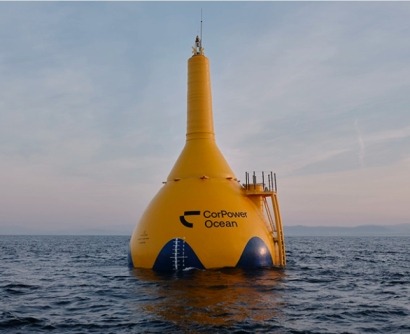
LUT University in Finland investigated a series of potential scenarios for the UK and Ireland to successfully transition towards a 100% renewable energy system by 2050. The best performing scenario in terms of managing energy system cost and security forecast that the UK should seek to harness 27GW wave energy capacity.
With electricity consumption potentially trebling by 2050, the study shows the UK will need 27GW of wave energy to reach the lowest cost, net zero energy system.
The report comes just days after CorPower Ocean announced a major industry breakthrough after completing the first cycle of the ocean commissioning for its first commercial scale device.
Successfully verifying storm survivability and efficient power generation in normal sea states, CorPower's C4 machine, deployed in the Atlantic off the coast of northern Portugal, has now overcome wave energy's toughest historic challenges.
Marine Energy Council Policy Director Richard Arnold said, "CorPower Ocean's commercial-scale breakthroughs in Portugal, demonstrates that wave energy is ready to realize its crucial role in a secure and cost-effective transition to net zero. LUT University's compelling report reinforces the importance of wave energy in the UK's energy transition. The UK has the maritime expertise, offshore engineering experience and supply chains to lead the world in harnessing wave energy. It is critical that the UK Government provides a clear route to market and supports the wave energy industry investing in coastal communities and beyond.
Just days ago, the Marine Energy Council gave evidence to the UK Government's Energy Security and Net Zero Select Committee inquiry into securing the domestic supply chain.
"The Government has an opportunity to embed UK content in marine energy projects deployed in its waters and around the world," added Arnold. "We are now calling for a consistent route to market for wave energy with clear and ambitious targets of at least 300MW deployed by 2035."
CorPower Ocean's Head of Business Development Anders Jansson said, "We've taken giant leaps in recent years to prove wave energy technology at commercial scale ... It's an inflection point which provides a firm signal of wave energy's readiness for widescale adoption."
LUT University's research paper ultimately concluded that a broad combination of renewables must be applied in the UK with storage, sector coupling, and flexibility in order to reach 100% renewable energy. This will involve a mix of renewables including wind, solar, wave, tidal, geothermal, biomass and hydropower. Researchers believe a fossil-nuclear approach with less sustainability and higher costs can be avoided.
Christian Breyer, Professor for Solar Economy at LUT University, who led the study, said, "For the first time we could show the high economic attractiveness of wave power for the entire energy system, which has to be now enabled with the right general framework for wave power."
The recent University of Edinburgh report, published in February, found deployment of just 6GW of tidal stream and wave each, will lead to a reduction in energy system cost of over £1bn per annum. Offshore Wind Consultants found co-locating wave and wind will lead to a 12% cost reduction for both technologies.
Andrew Bowie MP, Minister for Nuclear and Renewables, in the foreword to the University of Edinburgh report wrote, "The UK is a global leader in climate change, and we must continue to find and develop more ways to use naturally occurring renewable energy. We have some of the most promising renewable technologies available today on our doorstep, thanks to tidal's predictable generation and wave energy's significant potential."
LUT University's research article can be found here - Offshore versus onshore: The underestimated impact of onshore wind and solar photovoltaics for the energy transition of the British Isles – was recently published by the IET (Institute of Engineering & Technology).
The University of Edinburgh report can be found here – 2023 UK Ocean Energy Review

